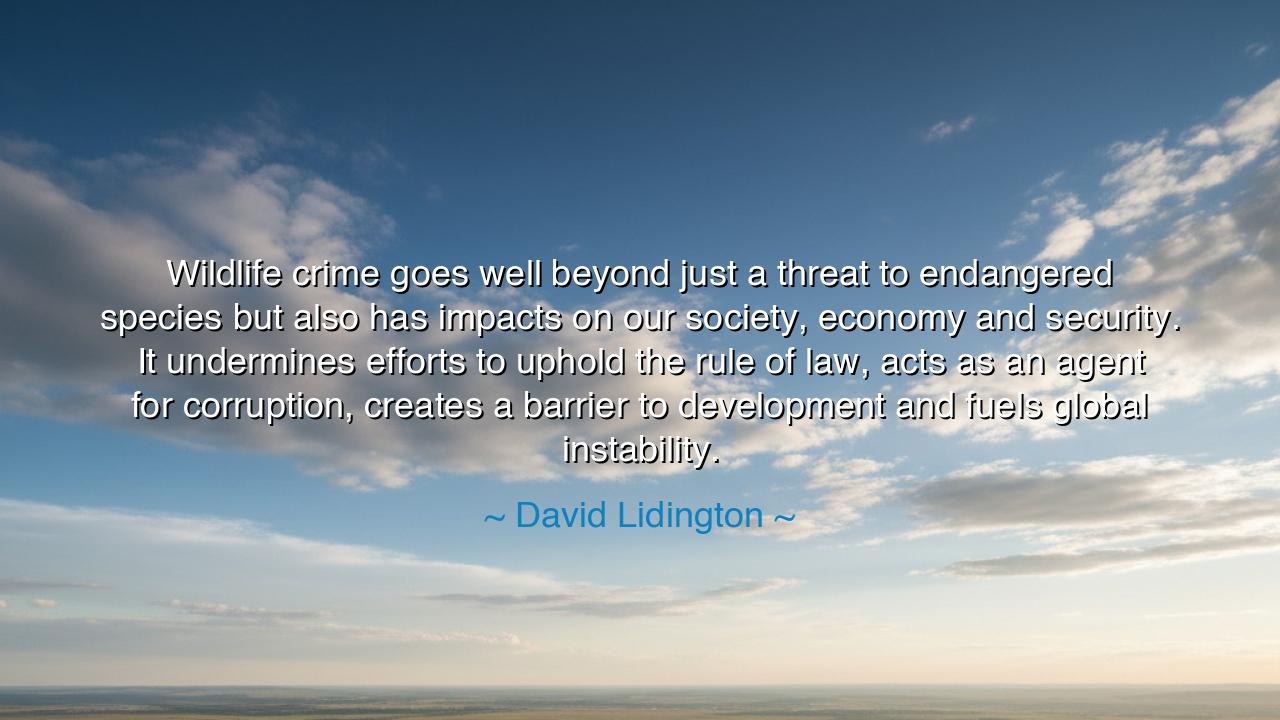
Wildlife crime goes well beyond just a threat to endangered
Wildlife crime goes well beyond just a threat to endangered species but also has impacts on our society, economy and security. It undermines efforts to uphold the rule of law, acts as an agent for corruption, creates a barrier to development and fuels global instability.






"Wildlife crime goes well beyond just a threat to endangered species but also has impacts on our society, economy and security. It undermines efforts to uphold the rule of law, acts as an agent for corruption, creates a barrier to development and fuels global instability." These words by David Lidington carry with them a profound warning, one that calls us to look beyond the surface of wildlife crime and understand its deep and far-reaching consequences. At first glance, the illegal trafficking of wildlife and the exploitation of endangered species may seem like isolated acts, affecting only the species involved. However, Lidington’s insight illuminates a darker and more complex truth: this crime is a cancer that spreads, eroding the very fabric of society, economy, and security. It undermines the rule of law, fosters corruption, stifles development, and shakes the stability of the world itself.
In the ancient world, the relationship between humankind and the natural world was seen as sacred. The Greeks and Romans viewed nature as a reflection of the divine order. Aristotle taught that everything in the natural world had a purpose—a teleology—that was intertwined with the well-being of human society. To harm nature, to exploit it recklessly, was seen as a disturbance to the balance of the cosmos. In the same way, the Romans understood the laws of nature as inextricably linked to the laws of the state. When society disrespected the natural world, it was not just a crime against nature—it was a crime against the very structure of civilization itself. Wildlife crime, though not as widespread in those times, was seen as a violation of the natural order, a precursor to larger societal decay.
But today, as Lidington points out, wildlife crime has become far more than just an environmental issue. It is a global network that spans continents, from the poaching of elephants for their ivory to the illegal trade in rhino horns, tigers, and countless other species. These acts of greed and violence are not just isolated offenses; they are woven into the fabric of global corruption. The illicit trade in wildlife often feeds into criminal organizations, fueling violence and instability. In countries where the rule of law is weak, the profits from wildlife crime are used to bribe officials, fund insurgencies, and perpetuate corruption at the highest levels of government. This undermines the very foundations of democratic institutions and civil society, leaving countries more vulnerable to global instability.
One striking example of this was seen in the rise of ivory trafficking in the late 20th and early 21st centuries. The slaughter of elephants for their tusks became a major international crisis, not only because it threatened the survival of these majestic creatures, but because the profits from ivory funded violent militias in war-torn regions of Africa. In countries like Sudan and the Central African Republic, the funds generated by the illegal ivory trade were used to finance conflicts, perpetuating cycles of violence and instability. The illicit trade in wildlife became so intertwined with global terrorism and criminal networks that it became a central element in the fight for national and international security. This example shows that when wildlife is exploited, it does not simply vanish into the shadows of the forest—it creates a crisis that threatens the stability of entire regions and, eventually, the world.
This corruption is not limited to foreign conflicts. Within developing nations, where poverty often intertwines with lack of opportunity, wildlife crime creates a vicious circle. Communities that rely on illegal trade as a means of survival are often trapped in a system that prevents economic growth and development. The illegal poaching of wildlife and the trafficking of rare species deprives these nations of natural resources that could otherwise be managed sustainably, promoting eco-tourism, and generating jobs in ways that would be beneficial to the local economy. Instead of helping these communities to prosper, wildlife crime keeps them locked in a cycle of poverty and desperation, as the wealth created by the illicit trade flows to criminal syndicates, rather than being invested in the people who need it most.
The lesson of Lidington’s words is clear: the consequences of wildlife crime go far beyond the immediate loss of species. It is a crime that ripples through the very soul of society, poisoning its institutions, undermining its laws, and feeding the forces of corruption and instability. It is a crime that holds the world in a stranglehold, preventing us from achieving the sustainability and peace that we so desperately need. To tackle wildlife crime, we must address not just the poachers and traffickers, but the root causes of poverty, inequality, and corruption that allow these crimes to flourish. We must also commit ourselves to the protection of the natural world, understanding that the health of the planet is not separate from the health of society itself.
In our own lives, let us reflect on the importance of preserving the natural world and the moral imperative to protect its creatures. We are the stewards of this earth, and it is our responsibility to resist the forces that seek to exploit it for short-term gain. Whether through supporting conservation efforts, advocating for stronger environmental protections, or standing against corruption, we can all play a part in creating a world where wildlife thrives, society flourishes, and justice prevails. Let us work together to protect not just the creatures of the earth, but the future of our world—one built on sustainability, integrity, and peace.






AAdministratorAdministrator
Welcome, honored guests. Please leave a comment, we will respond soon